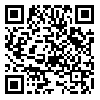Volume 14, Issue 4 (2-2021)
2021, 14(4): 85-103 |
Back to browse issues page
Download citation:
BibTeX | RIS | EndNote | Medlars | ProCite | Reference Manager | RefWorks
Send citation to:



BibTeX | RIS | EndNote | Medlars | ProCite | Reference Manager | RefWorks
Send citation to:
zarebi A, Jafari F, Hosseinian S, Abdollahi A. Psychometric properties of the Persian version of the Mental Health Literacy Scale (MHLS) on Iranian students in 1398. Research in psychological health 2021; 14 (4) :85-103
URL: http://rph.khu.ac.ir/article-1-3770-en.html
URL: http://rph.khu.ac.ir/article-1-3770-en.html
1- Al-Zahra University , arezoo.1358@gmail.com
2- Al-Zahra University
2- Al-Zahra University
Abstract: (10009 Views)
The aim of the present study was to prepare a Persian version of the Dias, Compos, Almeida and Palha (2018) Mental Health Literacy Questionnaire (MHLQ) and to examine its psychometric properties. For this purpose, 346 undergraduate, graduate and doctoral students of Shahroud University were selected in the academic year of 1398-99 through the available sampling. They completed the Persian version of the MHLQ (2018), Attitude Scale - Fischer and Farina (1995) - Short Form, questionnaire, and Health Anxiety inventory - Salkovskis & Warwick - Short Form (2002), and Beck Depression Questionnaire. The results of compound reliability for all subscales were more than 0.5, which indicates the desired reliability of the scale. CVR was more than 0.62 percent and the CVI was more than 0.75 percent, indicating the appropriate content validity of the scale. The results of the confirmatory factor analysis showed that the factor load of the items is more than 0.15 and all the routes from the items to the variable hidden at the level. 0.5 were significant and the scale had a good construct validity. An examination of the validity of the structure using CFA showed that the scale has a factor structure consisting of 4 subscales. The study of validity at the same time as calculating the correlation of this scale with the scale of attitude with the help of psychological psychologists - Fisher and Farina (1995) short form, Health Anxiety Questionnaire - Salkoskis and Varvik short form (2002), indicates a positive relationship between scale scores. The results indicate that the mental health literacy questionnaire is a valid and appropriate tool for use in Iranian society.
Type of Study: Research |
Subject:
Special
Received: 2020/06/11 | Accepted: 2021/11/23 | Published: 2021/12/11
Received: 2020/06/11 | Accepted: 2021/11/23 | Published: 2021/12/11
Send email to the article author
| Rights and permissions | |
 | This work is licensed under a Creative Commons Attribution-NonCommercial 4.0 International License. |





